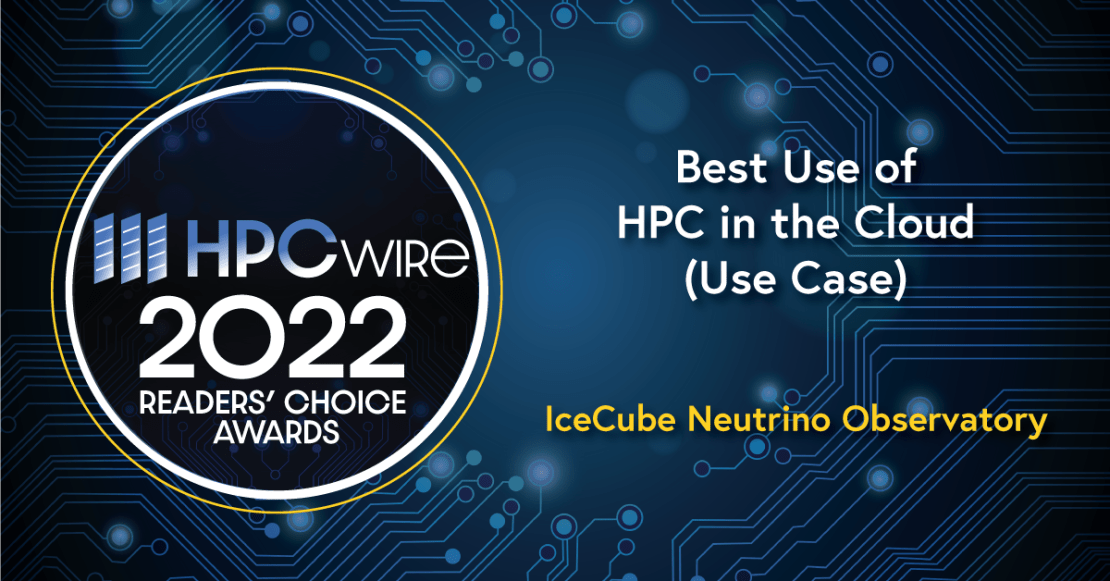20th Annual HPCwire Awards Presented to Leaders in the Global HPC Community

The IceCube Neutrino Observatory has been recognized in the annual HPCwire Readers’ and Editors’ Choice Awards, presented at the 2022 International Conference for High Performance Computing, Networking, Storage, and Analysis (SC22), in Dallas, Texas. The list of winners was revealed at the SC22 HPCwire booth as well as on the HPCwire website: www.hpcwire.com/2022-hpcwire-awards-readers-editors-choice.
IceCube was recognized with the following honor:
- Readers’/Editors’ Choice: Best Use of HPC in the Cloud (Use Case)
A collaboration between the San Diego Supercomputer Center and University of Wisconsin–Madison, the team used Google Cloud, Google Kubernetes Engine, and GPU sharing with Nvidia GPUs in Google Kubernetes Engine to expand the Open Science Grid and increase job throughput by about 40% to help detect neutrinos at the South Pole using the IceCube Neutrino Observatory.
“With the help of a public cloud, researchers can quickly get access to large computational resources when they need them,” said Benedikt Riedel, Global Computing and Technical Coordinator for IceCube. “Researchers, developers and infrastructure teams can run the workloads without having to worry about underlying infrastructure, portability, compatibility, load balancing and scalability issues.”
The coveted annual HPCwire Readers’ and Editors’ Choice Awards are determined through a nomination and voting process with the global HPCwire community as well as selections from the HPCwire editors. The awards are an annual feature of the publication and constitute prestigious recognition from the HPC community. They are revealed each year to kick off the annual supercomputing conference, which showcases high performance computing, networking, storage, and data analysis.
“The 2022 Readers’ and Editors’ Choice Awards are exceptional, indeed. Solutions developed with HPC led the world out of the pandemic, and we officially broke the exascale threshold—HPC has now reached a billion, billion operations per second!” said Tom Tabor, CEO of Tabor Communications, publishers of HPCwire. “Between our worldwide readership of HPC experts and the most renowned panel of editors in the industry, the Readers’ and Editors’ Choice Awards represent resounding recognition of HPC accomplishments throughout the world. Our sincerest gratitude and hearty congratulations go out to all of the winners.”
More information on these awards can be found at the HPCwire website (www.HPCwire.com) or on Twitter through the following hashtag: #HPCwireAwards.
About IceCube
The IceCube Neutrino Observatory is the first detector of its kind, designed to observe the cosmos from deep within the South Pole ice. An international group of scientists responsible for the scientific research makes up the IceCube Collaboration.
Encompassing a cubic kilometer of ice, IceCube searches for nearly massless subatomic particles called neutrinos. These high-energy astronomical messengers provide information to probe the most violent astrophysical sources: events like exploding stars, gamma-ray bursts, and cataclysmic phenomena involving black holes and neutron stars.
Over 350 physicists from 58 institutions in 14 countries make up the IceCube Collaboration. The international team is responsible for the scientific program, and many of the collaborators contributed to the design and construction of the detector. Exciting new research conducted by the collaboration is opening a new window for exploring our universe.
The National Science Foundation (NSF) provided the primary funding for the IceCube Neutrino Observatory, with assistance from partner funding agencies around the world. The University of Wisconsin–Madison is the lead institution, responsible for the maintenance and operations of the detector. Funding agencies in each collaborating country support their scientific research efforts.
About HPCwire
HPCwire is the #1 news and information resource covering the fastest computers in the world and the people who run them. With a legacy dating back to 1986, HPCwire has enjoyed a legacy of world-class editorial and journalism, making it the news source of choice selected by science, technology, and business professionals interested in high-performance and data-intensive computing. Visit HPCwire at www.hpcwire.com.